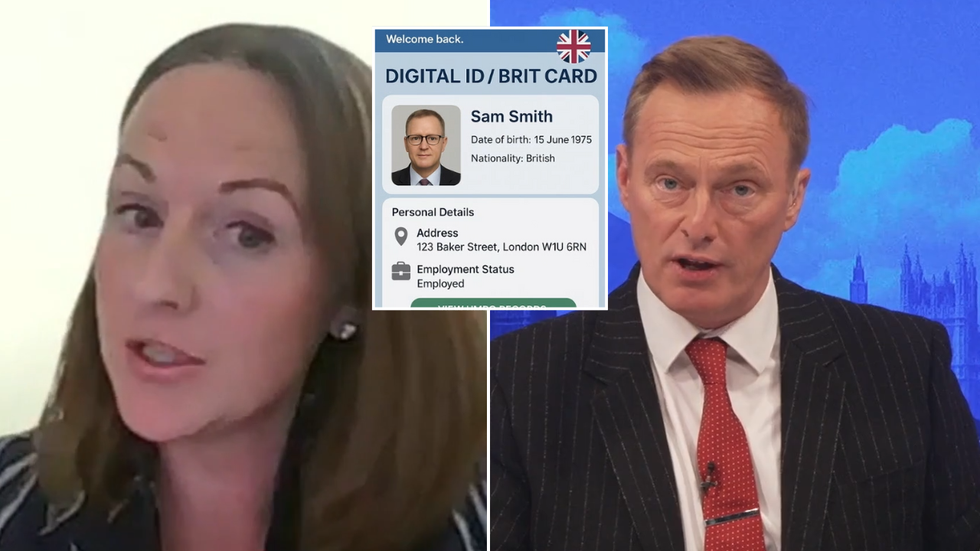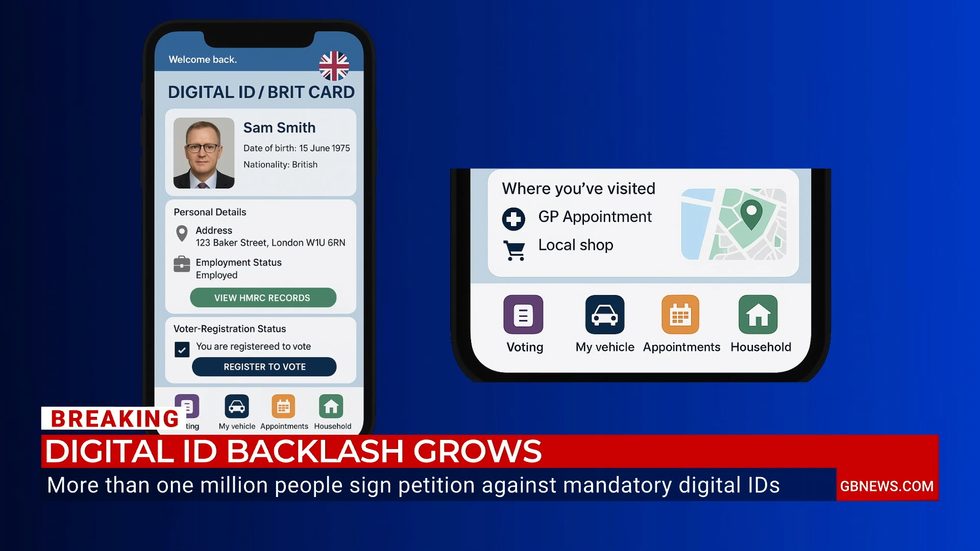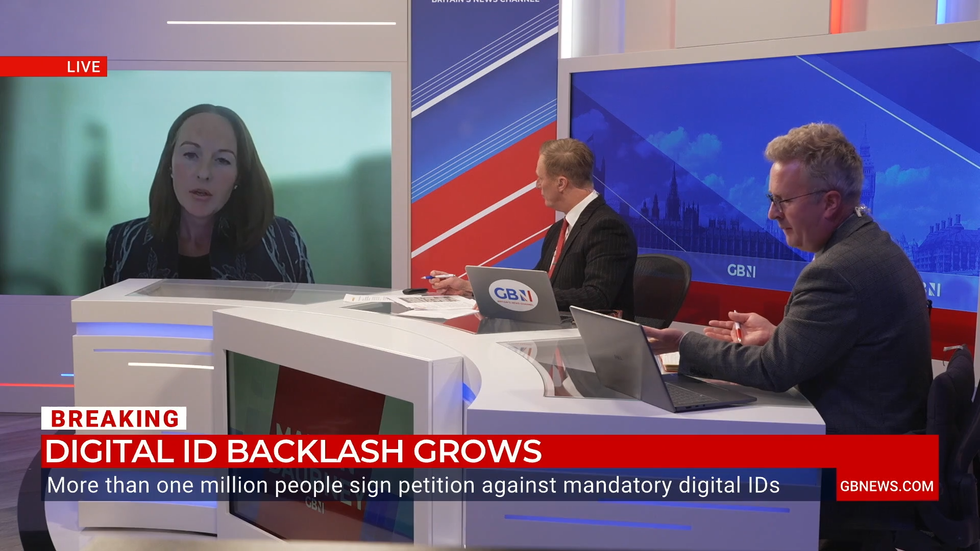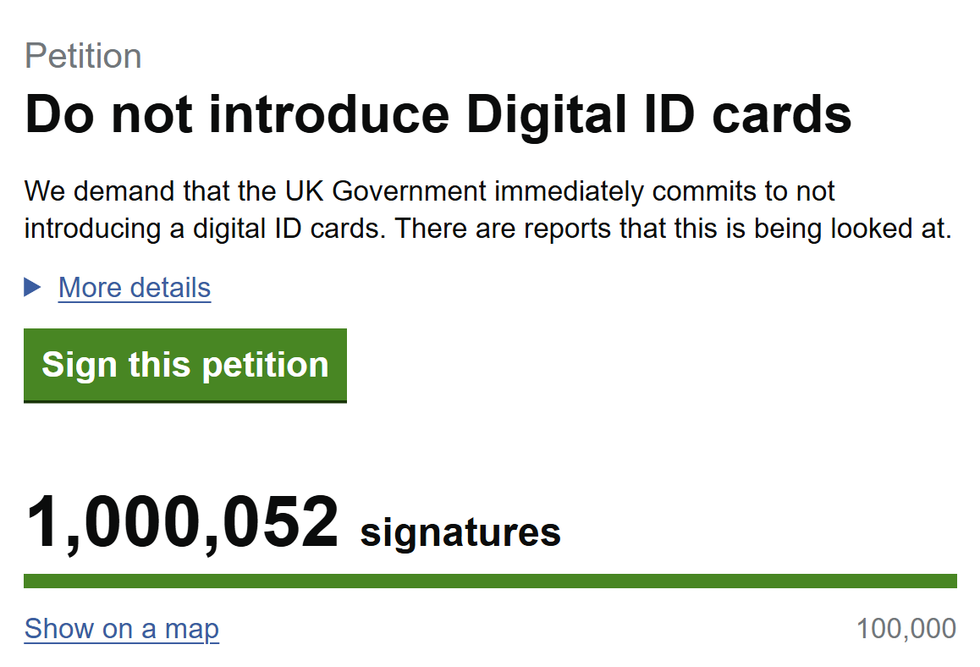Watch as GB News star Martin Daubney locks horns with Labour MP Lola McEvoy, who appeared on the People’s Channel to make the case for digital IDs.
A million people have now signed a petition railing against the rollout of digital IDs, which Prime Minister Sir Keir Starmer says will help curb illegal immigration.

Martin said regular citizens are effectively “surrendering their liberties” because the Government is incapable of tackling the migrant crisis.
She hit back: “I don’t see it as a surrendering of liberties to digitise an existing form of ID.
“The petition you mention is about stopping digital ID cards, we’re not bringing in ID cards. This is about a digitised form of identification…”
“That’s semantics”, Martin interjected. “You know fully well that is semantics.”
LATEST DEVELOPMENTS
- Digital ID petition smashes ONE MILLION signature mark as Britons fight back against Starmer’s plan
- Keir Starmer faces digital ID Labour revolt after Nigel Farage leads challenge against PM’s plot
- Keir Starmer’s right-hand man claims Nigel Farage ‘hates Britain’ in stinging attack against Reform
Ms McEvoy insisted that was not the case, saying “it’s the truth”, before adding: “National Insurance numbers are easy to share.
“If you have a central point of digital ID, stored on your smartphone, to prove you have the right to work, that will massively add productivity and will also benefit employers. It’s a good thing.

“93 per cent of this country has a smartphone, we’re already giving away our data to other companies who know more about me than the Government does.”
Martin interjected again, saying “we’ve seen Governments in the past clamping down too much on civil liberties”.
He said people on the “authoritarian left” have long called for a digital ID and Labour is already “letting the cat out of the bag” in terms of what it actually wants.
“Be honest”, he said. “This isn’t about controlling immigration. It’s about controlling services for all British citizens.”

Ms McEvoy continued to argue that digital IDs will promote efficiency and also crack down on things like illegal immigration.
GB News’s Political Editor Christopher Hope put it to Ms McEvoy that older generations could be left behind, with many not having access to online platforms.
“I do hope we can access services online in the future easily. The state is lagging so far behind. Public services are under so much pressure already”, she argued.
Martin said Ms McEvoy’s arguments point to a much-expanded list of uses for digital ID, a contrast to Labour’s original claim that it will be used mainly for cracking down on illegal immigration and illegal working.
“It’s a front”, he argued, a point she once again railed against.
“I don’t think there’s been any front here”, she said. “I have been campaigning for digital ID because I use digital platforms in every day life.
“The most pressing issue for the use of digitisation of ID is to make sure people aren’t working illegally and to make sure businesses aren’t employing an illegal workforce and paying their taxes.
“In terms of the digitisation of society, we already have the NHS app, the HMRC app. In terms of older people, this is about right to work. You have got to prove, using this ID, that you have the right to work in this country.

“This won’t apply to pensioners. We are going to be rolling out a digital inclusion strategy as well.”
Sir Keir Starmer unveiled plans today for a digital identification system during his address at the Global Progress Action Summit in London today.
The proposed “Brit-Card” scheme would enable citizens to verify their eligibility to reside and work in Britain through a smartphone application.
The digital identification initiative, which requires public consultation and parliamentary approval, represents a significant shift in Government policy towards managing immigration.
Speaking alongside Australian Prime Minister Anthony Albanese and Canadian Prime Minister Mark Carney at the summit, Sir Keir outlined how the system would function as a verification tool for employment and accommodation purposes.
The announcement follows mounting pressure to address immigration concerns, with 1,157 individuals crossing the Channel in small vessels over the past seven days alone, based on Home Office data.
VOTE NOW: POLL OF THE DAY: Are digital IDs an attack on our freedom?
Under the proposed system, individuals seeking employment or accommodation would need to present their digital identification via a mobile application.
The technology would cross-reference details against a government-maintained registry of residents authorised to live and work in Britain.
Our Standards:
The GB News Editorial Charter







Follow